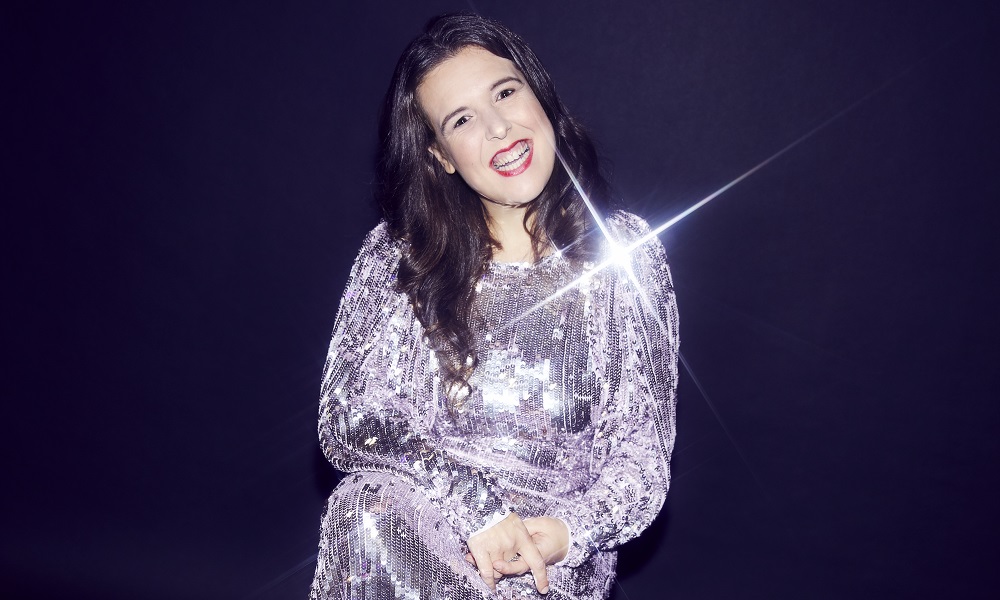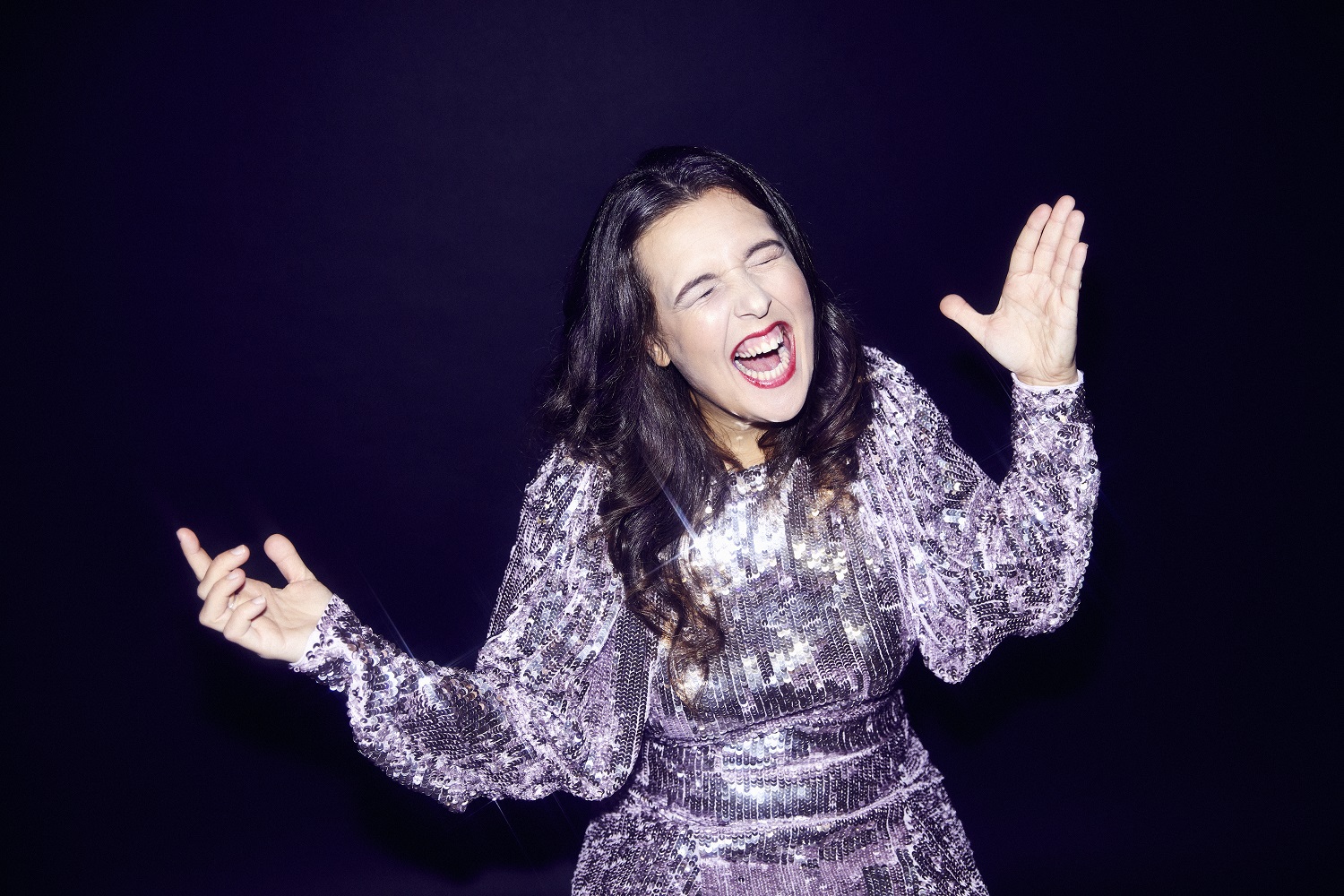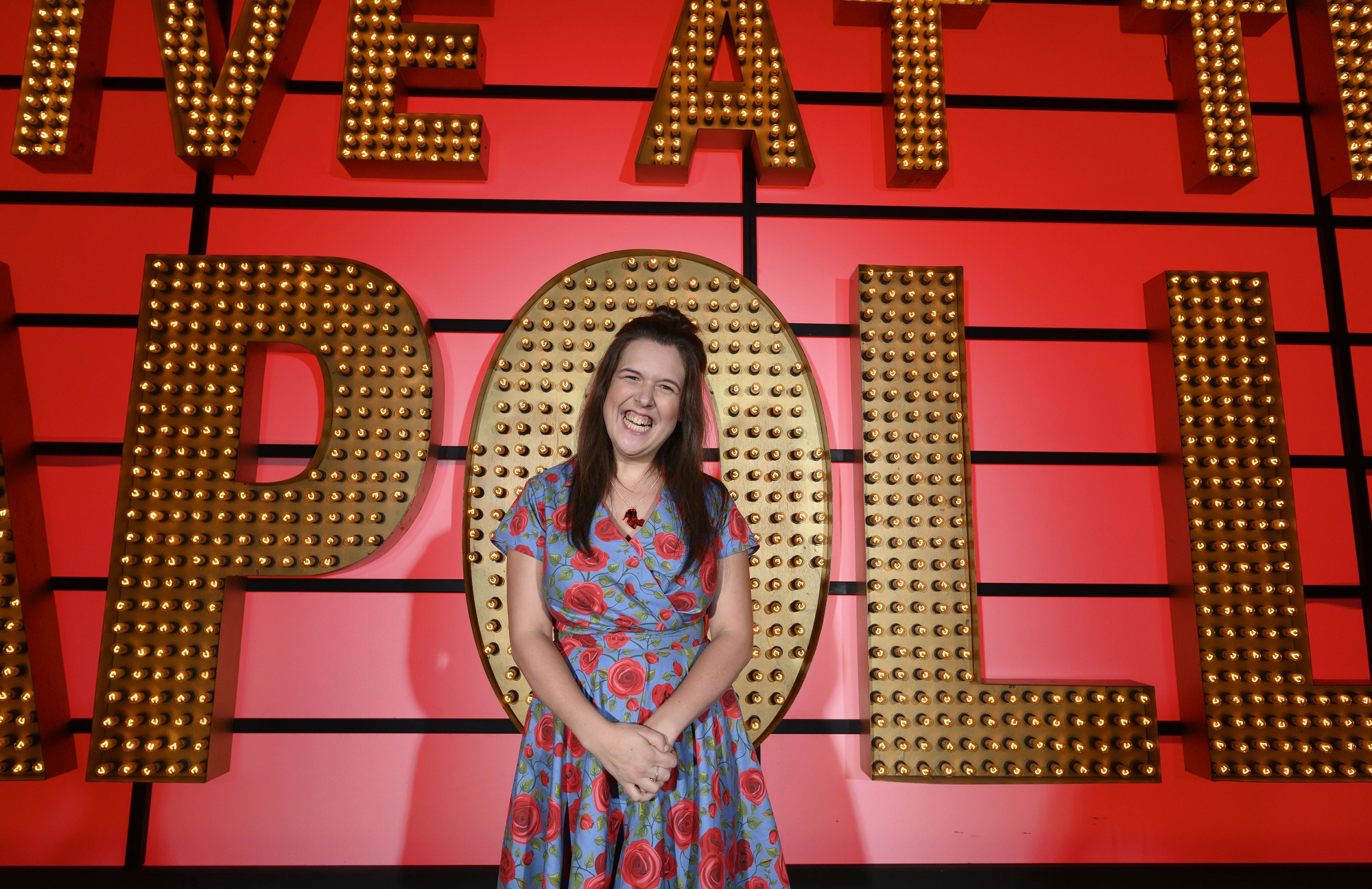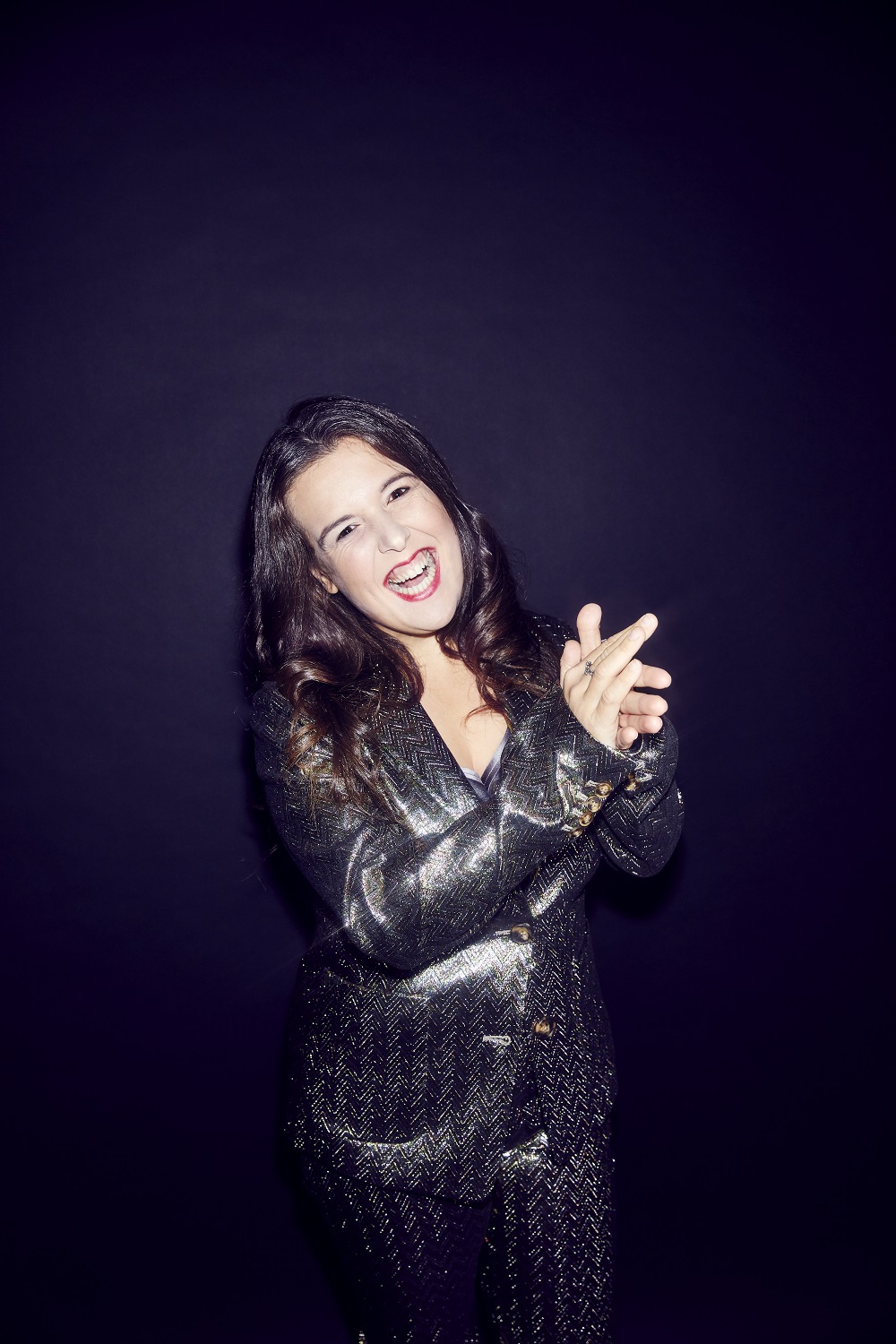Rosie Jones: ‘I feel like I’m the only disabled, gay woman going, “Hello, we’re here”‘
Attitude’s reigning Comedy Award winner travels up and down the country in her new series, Trip Hazard: My Great British Adventure.

This article first appeared in Attitude issue 330, January 2021.
Minor amendments have been made for context.
Words: Thomas Stichbury
Halfway through the interview, my stomach drops and I suddenly panic that I haven’t hit the ‘record’ button on my dictaphone; it’s happened once before, while trying to decipher will.i.am’s ramblings (a small mercy, some might say). I lean forward to check. “I’m not saying it all again,” Rosie Jones sternly warns – before giving me a flash of her mega-watt smile. In this instance, I thankfully had pressed record.
I’ve chatted to a few comedians in the past, the majority of them middle-aged men, and without being rude, while also being rude, they were the antithesis of their on-screen personas: moody bastards, to be frank. Rosie, on the other hand, is as effervescent in the flesh, the human equivalent of a hot-water bottle, guaranteed to warm and bring joy to even the coldest of hearts. Just the medicine we need right now.

Credit: Zoe McConnell
This is not to say that our Attitude Comedy Award-winner is in any way fluffy – anybody who has seen Rosie’s brutal takedown of fellow comedian Alex Brooker in Comedy Central’s Roast Battle knows she has a nerve-tickling edge to her humour. “In reviews I get described as quite dark, but I don’t think it’s that dark. I don’t talk about murdering… yet,” she teases.
Describing her rise through the ranks as “scarily quick”, 30-year-old Rosie began her career behind the scenes as a television researcher: “People [had] said to me, ‘You should be a comedian,’ but I never took it seriously until I started working in comedy in panel shows. I would look at the comedians – and I don’t want to slag off every TV comedian – but… I would look at them and think, I can do that. I started slowly, at little open-mic gigs, but quickly found that I was OK at it.” More than OK, babes.
As well as being a familiar face on the panel series she refers to, including 8 Out of 10 Cats and Would I Lie To You?, Rosie also has a sellout run at Edinburgh Fringe under her belt, and gigs almost nightly – indeed, she has to dash straight from our photo shoot to a show. Does she ever get nervous? Comedy crowds are an intimidating bunch, after all. “I’m happiest when I’m on stage and I hope that shows,” she replies. “I’m the most relaxed [there], mainly because I’m an attention-seeker.”
She has had to adapt her pre-performance routine over the years, though: “My only ritual was to drink three pints, but when you’re gigging every day, you can’t do that!”
Rosie has Ataxic cerebral palsy, which affects speech and mobility, and she explains how she developed a sense of humour as a “self-defence mechanism”, and also to make others feel comfortable in her company: “Having cerebral palsy means that some people are awkward around you, or don’t know how to speak to you, so from a very young age I learnt that if I was able to make a person laugh, it would break down the barrier.
“It just makes my life as a disabled person so much easier,” she adds.
In preparation for the interview, I watched Rosie’s Live at the Apollo show on the BBC – if you haven’t watched it yet, what are you waiting for? Well, finish reading this first, obviously – which she opens with the following firecracker: “Let me address the disabled elephant in the room… that’s what my mum calls me. Bitch.”
The comedian – who writes and acts – acknowledges that a lot of people have tunnel vision and only see her disability. “One hundred per cent,” she begins. “When I wobble on stage and start speaking, people automatically feel awkward. I think especially with the slow speech, a person might think that I’m not intelligent. They judge me on how I walk and how I talk, which as a comedian can be tricky, because if you’ve only got ten minutes to make someone laugh, I’m already starting on the back foot. My first joke needs to put me back to zero and I do that by doing a short joke, so they can get used to my voice.”
Reflecting on the obstacles she comes up against on the comedy circuit, but also that minefield we call life, Rosie says they range from the physical – “a lot of comedy clubs still aren’t accessible for disabled people, a lot of stages, [I’m like], ‘How do I get up there?’” – to proverbial hurdles in the shape of human ignorance and downright stupidity. “I get a lot of stupid [questions] about my disability: ‘Can you have sex?’ ‘Are your parents disabled?’ Will your children be disabled?’ And it’s like, no, you moron.
“You’ve been all right,” she assures me, with a grin.
Far from a laughing matter, too, is the lack of representation in the media – of disabled performers and “all minorities”. Rosie maintains that the reason she “went into TV in the first place” is because she never saw herself being represented on screen, not only as a disabled woman, but as a disabled, gay woman: “Growing up, I never saw someone disabled on telly. Although I had a happy childhood, in terms of the media, I never felt valid. I wanted to change that, I wanted somebody to tell my story… as I got older, I thought, no one can tell my story apart from me.”
She continues: “Shows like The Last Leg [presenters Adam Hills and the aforementioned Alex Brooker are both amputees] are amazing, but I also fight for all minorities, and I still think we’ve got a problem of intersectionality. I feel like I’m the only disabled, gay woman going, ‘Hello, we’re here.’”
Rosie wrestled with her sexuality for a long time, before finally coming out three years ago. She thought it would make her too different, that “being disabled was enough”.
“People have accepted me as disabled, to add something else – it blew my mind, and I was the one having the feelings,” she reveals.

Credit: BBC
Remembering “wanting to kiss a girl [when] I was four”, Rosie tried to bury her feelings and even had homophobic thoughts for a while. “For years, I thought, I’m not gay, I don’t want to be a PE teacher,” she recalls, with a shake of her head. “I have long hair, I wear dresses. It was only moving to London and being able to go out… realising that I could be gay without changing my image or my ideas or my job.
“Turns out I can put my hockey stick in the bin, I don’t need it,” she quips.
Rosie’s parents were incredibly accepting – almost disappointingly so. “I built it up in my head, you see such dramatic coming-out stories on TV, so I think I wanted a big reaction, and I was like, ‘Mum, Dad… I’m gay,’ and they were like, ‘Yep.’ Come on!” she dramatically exclaims. “No, they were really great, it was never an issue.”
Friends with a gaggle of gay men and drag queens, Rosie reminisces about hitting Soho in the early noughties, before she was ‘out’. “Soho was a lot bigger [than it is now], it’s really sad,” she sighs, as we become misty-eyed about long-gone-but-never-forgotten haunts such as Madame JoJo’s and Trash Palace. “Because I was still dealing with my sexuality, I never went out to kiss girls, I just went out to dance.”
Nowadays, Rosie is far more proactive when it comes to her love life. In fact, she recently decided to explore the tumultuous world of online dating, where true love – or a self-esteem-sucking ghoster – is a mere swipe away. “It is shit, it is really bad,” she groans. “I think being a comedian is hard because I’m bloody on the road all the time. But I’m happy. I know when I’m ready, I’ll meet someone and that will be great.”
There is one woman that tickles Rosie’s fancy, her celebrity crush Gillian Anderson – “My number one… she gets better with age” – and she was able to work with Gillian, in a roundabout way, when she wrote on an episode of Netflix’s BAFTA-nominated comedy-drama, Sex Education.
Invited into the writers’ room for the second series, she praises the show for leading the way when it comes to embracing and empowering diverse storytellers: “There were eight of us; six were women, seven were queer, and I think there were three people of colour. Everyone there had their own story and their own experience of sex and school and childhood. It was great, because we were paid to sit in a room for six weeks and talk about sex!”
Next up, Rosie will join acting queen Olivia Colman in overseeing a comedy-writing competition called Screenshot – launched by Colman’s production company, South of the River Pictures – alongside fellow judges Phoebe Waller-Bridge and Lolly Adefope, to find budding writer-performers. “I really hope I leave with three new best friends,” she gushes – being buds with Olivia certainly would be the jewel in The Crown (sorry).
Every comedian knows they’ve made it when they land their own travelogue show, and Rosie will tick that box with Channel 4’s upcoming series, Trip Hazard: My Great British Adventure. “We went up and down the country, just seeing the brilliant things about the UK.
“I didn’t even need to bring my dad along,” she adds, in a playful jab at a swathe of rival shows featuring comedians and their plus-one parents.
Ruminating on the future of her comedy, Rosie states that her disability, or sexuality, won’t always be at the centre of her material; they are important parts of her identity, yes, but by no means the whole.
“I like to make people think above their own life and their own world, so a lot of my comedy is showing someone what it’s like being a disabled, gay woman — a lot of fun,” she affirms. “[But] I hope there’s a day when I can mention it on my terms. My disability will always be a part of me and it’s something that I am in no way ashamed about — I love it.”
She continues: “I might do one gig where I talk about being disabled, and then another gig where I don’t. Not every gig do I say, ‘Hello, I’m gay’ – it’s a part of me, but I don’t need to mention it every time.”
That being said, above all, Rosie wants to shine under that spotlight and provide the visibility that was so sorely lacking for her as a child: “I want to be present and be in the media, so that if a little disabled girl out there is going, ‘Why do I want to kiss girls?’ They can turn on the telly and go, ‘Oh, it’s OK.’”

Credit: Zoe McConnell
Things are about to turn from the sweet to the nasty, as I challenge Rosie to ‘roast’ me – not the first time I’ve uttered those words. “I can’t do that!” she protests. “The secret behind Roast Battle is that I have four days to write the jokes.”
I tell Rosie that she can email me her roast: “Deal.” And a few days later, an email arrives from Rosie’s publicist. “This is possibly one of the strangest things to forward to someone via email – Rosie has just sent us the below (and added that she hates being mean!),” she writes.
Here we go… “Tom is so s*** at his job, he finds all his interview questions by scraping the bottom of the barrel… actually, it’s where he finds all his hook-ups, too.”
Fair and accurate. Tou-***ing-ché.
“My disability will always be part of me and I am in no way ashamed — I love it”
Rosie Jones’s new series Trip Hazard: My Great British Adventure starts tonight (Friday) on Channel 4 at 8.30pm
